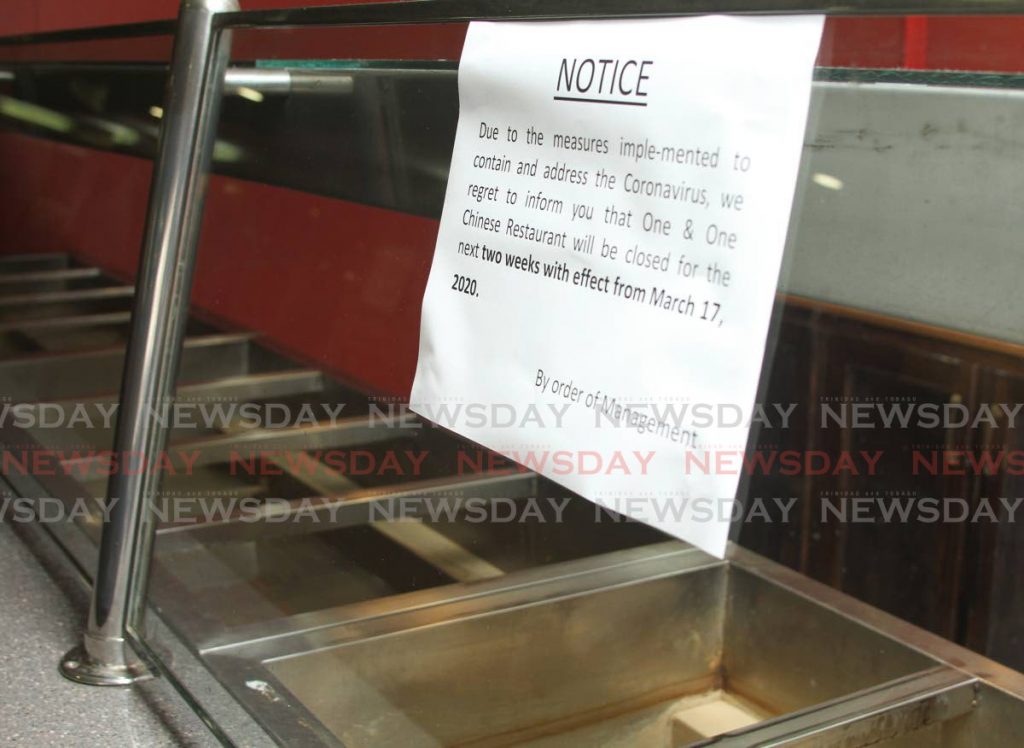Pandemic leave:Self-employed left hanging

KERRY PETERS
Cabinet, as late as Wednesday morning, was set to approve sweeping measures aimed at protecting the rights of workers during the coronavirus outbreak and preventing workplace transmission.
They include guidelines for employers for staggered hours, remote work, and a new type of leave called pandemic leave which is designed to protect public and private-sector employees who are directly impacted by the virus from a loss in earnings.
Yet while the proposed policies will mitigate the financial impact on traditional employees, one major category of wage-earners appears to have been overlooked: self-employed individuals.
Indeed, covid19 has revealed gaps in TT’s labour policies, social welfare supports, and crisis response which remain out of step with the reality of work for a growing number of people.
“I have already lost work. A couple speaking engagements got cancelled so I lost income from that,” said Jamila Bannister who owns a marketing consultancy.
Bannister is just one of many.
To be clear, self-employed individuals include anybody from high-earning consultants to low-wage service industry workers such as the people who cut your grass or work in child care.
They include freelance workers, event planners, people who do private transportation, and dozens of other workers broadly identified as independent contractors.
They are also your sole proprietors, veterinarians and doctors in private practice, as well as the emerging army of gig workers who make a living enabled by some form of digital technology.
Given the rate at which they could lose paid work, these wage-earners are particularly vulnerable during the covid19 crisis. And they are much less likely to have access to credit.
Worse, without the benefit of contractual or statutory paid sick leave or other kinds of income support, these workers are also less likely to practice social distancing if they feel they have no other choice but to work.

And yet none of the measures announced by Minister of Labour Jennifer Baptise-Primus during a press briefing last Sunday at the ministry’s head office in Port of Spain, provides direct or indirect financial relief to any of these wage-earners in light of covid19.
Case in point: The proposed pandemic leave which offers no income support even for self-employed individuals who may fall ill from covid19 or require extended time off from work for medical observation, hospital-based quarantine or home-based self-isolation.
Speaking at the event, the Labour Minister left little room for doubt about the intended target of the new policy guidelines.
Said Baptise-Primus: “If someone is self-employed that person is responsible for himself or herself like any other member of the community.”
But that response is at odds with what is happening in other countries around the world.

One week ago, the US House of Representatives passed an economic relief bill dedicating billions of dollars for paid sick leave, unemployment insurance, free testing and other measures to help Americans impacted by the crisis, including the owners of small and mid-size companies, gig workers and self-employed individuals.
Similar stimulus packages have been tabled in Canada, Ireland and the UK.
Baptiste-Primus would only say that an economic relief package with provisions for self-employed individuals would be a matter for Cabinet consideration.
One day after the Ministry of Labour’s press event, the Prime Minister announced the establishment of a number of committees which would advance additional policy measures to deal with the crisis but up to press time there has been no word on whether self-employed individuals have been considered.
For now, pandemic leave, the key measure in the Labour Ministry’s new policy guidelines, caters only to the large swath of traditional employees who either can’t report for work based on circumstances caused by the coronavirus pandemic or are not entitled to paid sick leave.
Chief Personnel Officer Darryl Dindial said then that the goal was to ensure that any protracted absence from duty did not affect employee entitlements such as pensions, gratuities and increments.
He explained that pandemic leave can be used in a number of situations.
It will guarantee paid time off for any worker who is not entitled to contractual or statutory paid sick leave, not least temporary, contract and daily rated workers who don’t usually get such benefits.
Such employees will qualify for pandemic leave with no impact on job security or earnings if they fall ill or require extended sick leave because of covid19.

But you don’t have to get sick to qualify for pandemic leave.
Pandemic leave will also govern all private and public-sector employees – including those in state enterprises – who have no choice but to remain home with their children following the Prime Minister’s decision last to close schools and universities until April 20.
In these cases, employees who have no other means of accessing child care can apply for pandemic leave for as long as schools remain closed, though the precise nature of the application process remains unclear.
Employees who have already exhausted their standard allotment of sick days will also be entitled to pandemic leave without a loss in earnings for as long as schools remain closed.
Across the board, eligible employees include permanent and temporary employees, employees on fixed and short-term contracts, on-the-job (OJT) trainees as well as hourly and daily-paid workers.
Pandemic leave guidelines
The Labour Ministry's guidelines for employers and employees for covid19.
1) Children are not to be at workplaces/compound/vehicle etc.
2) All parents are encouraged to use support systems (babysitter, family, etc.)
3) Employers are to implement remote work policies.
4) Employers are to explore options of shift work/ or rostering.
5) One parent is encouraged to stay at home and look after the child or children.
6) If work arrangements can’t be made, the employee is to stay at home and can’t be penalised or not be paid in such an instance.
7) If you are not genuinely sick don’t stay away from work.
8) Pandemic leave for public officers (contract or not), fixed terms employees, short term, OJT, officeholders who are with service commission, freelancers, persons employed less than a year, daily paid, etc.
9) Mechanisms in place for public officers with no more sick leave can get an extension of sick leave with full pay.
10) Minister of Labour advises private employers with the union to seek guidance with respect to sick leave clearance for employees who need pandemic leave. If there is no union, seek guidance from the ministry (Conciliation Advisory and Advocacy Division) – 299-0300 ext 2043, 2124.


Comments
"Pandemic leave:Self-employed left hanging"